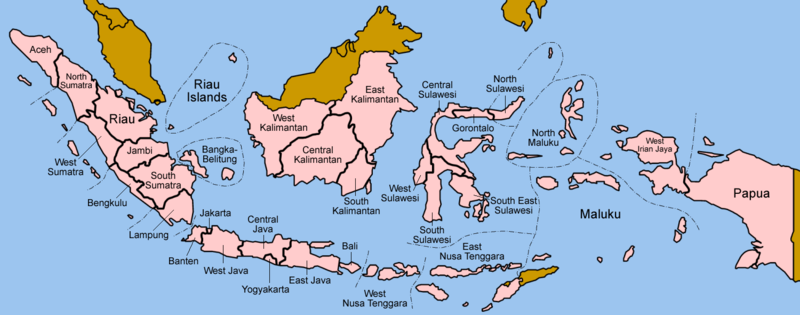Indonesia is a country geographically divided by the Indian Ocean, comprised of many islands with a population ranging from groups of rural villagers to modern urban city-dwellers. Its cultural make-up is varied; for example, although the country's official language is Indonesian, BBC News' "Indonesia Country Profile" states that over 300 regional languages are spoken throughout the country. Similarly, the country's major religion is Islam, although the island of Bali holds a largely Hindu population. Politically speaking, Indonesia is a democracy, albeit a brand new one. The country's first democratic elections took place in 2004, after nearly 40 years under dictator Suharto.
Indonesia is comprised of thousands of small islands between Australia and Asia. Image Credit: conradaskland.com
Despite the country's democratic standing, it appears that a system of royalty based on familial connections is still supported and honored by the Indonesian political system. Hasyim Widhiarto's April 13, 2011 article “Open Door For Children of the Political Elite” in The Jakarta Post describes how adult children of politicians enter politics with surprisingly little interest or experience. Funded by their parents' political parties, these scions are elected only to delegate their official responsibilities to staff members. Widhiarto focuses on the example of Edhie “Ibas” Baskoro Yudhoyono, the son of Democratic Party founder President Susilo Bambang Yudhoyono. In a style that is clearly either translated from Indonesian or written without full command of the English language, Widhiarto writes that Ibas was “appointed the party’s secretary-general without any sweat,” yet is “rarely seen attending meetings or hearings at the House of Representatives.”
. Along the same vein, Widhiarto's next article, posted the same day and entitled “Heirs to the Throne,” provides a list with photos and biographical information of each “child” in the elitist political network. Included among each person's marital status and education are facts that illustrate either special treatment within Indonesia's military or prominence in the country's politics.
Capt. Agus Harimurti Yudhoyono, the crown prince of the Yudhoyono and Wiboyo, is quoted in "Heirs of the Throne" to have enjoyed "enjoyed numerous privileges during his career in the military, including exclusions from posts in conflict areas in Indonesia." Image credit: denniocastafiore.wordpress.com
“Open Door For Children of the Political Elite” appears to be trying to shed light (carefully, considering Indonesia's policy on defamation, which carries a punishment of imprisonment) on what appears to be a somewhat illegitimate government practice. Considering that, according to epapercatalog.com, The Jakarta Post circulates 50,000 papers daily and keeps a current online edition, this information appears to be newsworthy to at least a small population of Indonesia's residents.
Whether these articles indicate true corruption within Indonesia's government or merely convey one media outlet's frustration with the system, the concept of family ties within government is shown here to be inherent to Indonesia's culture. From this, one can tentatively assume that family tradition and cohesiveness, at least among Indonesia's elite class, is an important tenet of the Indonesian value system.


No comments:
Post a Comment